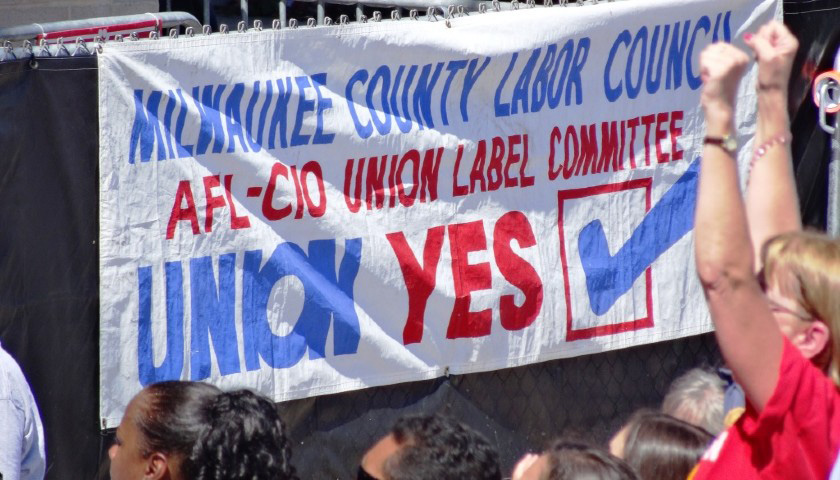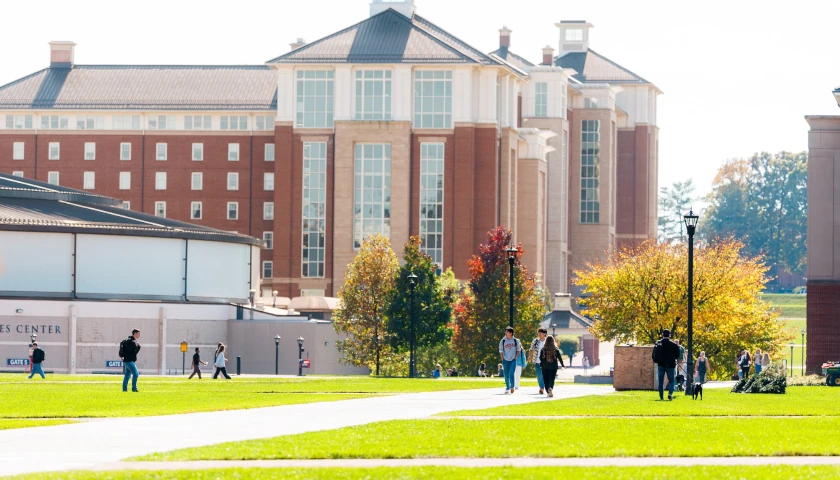by Brian Dijkema
It is no coincidence that what finally broke the Soviet Union was a Catholic trade union — a group of shipyard workers, led by an electrician and motivated by a faith that their oppressors deemed an opiate.
Christianity and its sweeping social vision enlivened the workers in Gdansk and their entire nation and, a decade later, a totalitarian superpower claiming to speak on behalf of all workers around the world had vanished. The forbidden revolution of workers bound together in solidarity around a shared vision of dignity, work, and the common good did what tanks and armed divisions had failed to do: it ended communism and gained freedom for millions.
When we celebrate the triumph of Solidarnosc over Stalin’s heirs, we should never forget that the movement that toppled the Soviets started because a woman was unjustly fired. It was a workers’ movement before it was a political movement.

The Cold War is receding into history, but conservatives rightly hold fast to its vital lessons. One of those lessons is that the conservative mind and the conservative heart should take a keen interest in a thriving labor movement.
Trade unions — associations of workers who organize together for the purpose of achieving justice in the workplace — are not, and should not be considered, the exclusive domain of the political left. Rather, the principles of a vital labor movement have more in common with the principles of the healthiest tenets of conservatism today. The institutional representatives of the conservative movement ought to take organized labor seriously.
Labor and the Right
Enthusiasm for a strong labor movement is anything but Marxist. Labor in America — while certainly influenced by a wide range of intellectual and religious sources — has been pragmatic and should cast doubt on any narrative that places ideology at the center of its history, past or present.
It was not simply a matter of workers looking after their stomachs — there is plenty of concern and discussion about what constitutes life, liberty, and the pursuit of happiness in American labor history. But in most cases, one finds less concern with Marx and a workers’ revolution than with dignified work that provided for a well-stocked family kitchen. The same is true today. Graduate students hired as union administrators in Washington might be interested in social constructs, but most moms with SEIU membership cards are more interested in a job that allows time to help with their kids’ social studies.
Even on purely theoretical grounds, thriving trade unions are a failure of the Marxist program. Karl Marx saw trade unions as integral parts of a capitalist system to be “dispensed with” as soon as capitalism was overthrown. By contrast, and contrary to common conceptions, a thriving trade union movement with a sustained focus on improving the lives of working people is indicative of robust and mature democratic capitalism, not Marxism. This is why communist countries such as China and Cuba will not tolerate free trade unions, even today. The compromise, trust, integrity, and democratic character needed to make trade unions flourish are the very things that totalitarian regimes wish to suppress.
Unions are, in many ways, a quintessentially Tocquevillian association. Conservatives, who pride themselves on their support of liberty, emergent order, and association outside of the state, should see the spontaneous ordering and pre-political nature of organized labor as something in line with — not opposed to — their principles.
Trade unions can, in turn, bolster other social institutions — most notably the family. Good education allows for good work, good work allows for good wages, good wages provide security to form a family, a stable family provides the best context in which to receive a good education, and so on. As Andrew Cherlin and others note, labor unions have played, and still might play, an important role in providing Americans with the financial and social stability to proceed along that virtuous circle.
We know, for instance, that stable income from the state can function as a stabilizer on marriages — at least for men. Why, if we care about restraining the role of the state, should we not look upstream to institutions that secure higher wages that might also help to stabilize marriages? We know that parenting with less stress leads to better outcomes for children’s educational and economic prospects, but is increasingly the domain of the wealthy. Why should it stay that way? Why not support institutions that give workers real input on their work schedules?
Labor and the Left
Most conservatives today see matters quite differently. The right-of-center’s conventional narrative about labor markets is one in which individuals — totally unconstrained by any other institution — form contracts with their employer in their personal interest and in response to the laws of supply and demand. If trade unions arise, it’s because an employer failed in some way — either to recognize market forces or to address workers’ demands — or else because unions have coerced workers into joining. In a debate about Catholic social teaching on labor, Charles Baird encapsulated this perfectly when he said: “Good jobs are union-free jobs.”
This conservative hostility is perhaps grounded in politics more so than ideology. American labor unions have in practice been owned by — or, in a sense, are the owners of — the Democratic Party. In the last presidential election, America’s big unions spent hundreds of million of dollars, the majority of which went to the Left’s political causes, and Hillary Clinton received over 97% of labor’s spending on the presidential race. This, despite union households favoring Hillary Clinton over Donald Trump by only 8 points according to exit polls. Among national politicians, only one Republican is among the top 20 recipients of labor’s contributions. The relationship goes far beyond the cash. Most of labor’s activism — from its on-the-ground support of Democratic candidates to the proliferation of labor-funded community organizations — tilts left.
As a result, most people, both right and left, believe the principles of labor — its intellectual, even spiritual roots — to be fundamentally leftist. The story goes something like this: Organized labor assumes that capital, usually in the form of the business corporation, is inherently exploitative. Both assume an adversarial relationship between the worker and the employer in which collective bargaining is but a means of achieving a ceasefire that can never yield lasting peace.
This plays out not just in constant martial metaphors — “Fight for 15!,” “union busting!” — but in the legal structures of labor relations.
The Wagner Act, created in the middle of the Great Depression, and which forms the backbone of American labor relations law, manifests an ideological belief that workers and owners are adversaries. Other, more cooperative or communal structures of labor relations are, in most cases, explicitly prohibited. Instead, the law requires that workers, their unions and the companies they work with act in opposition as they organize and bargain to reach an agreement that maximizes workers’ interests — even if it comes at a cost to the company or the economy; even it means that labor uses the powers of the state to achieve those interests.
A Better Future for Labor
So yes, the way trade unions work in America today is unquestionably a problem. They force membership — either through the law, through thuggery or through sweetheart deals with government. One can’t deny that most of this behavior is a violation of what Pope St. John Paul II called “the subjectivity of the individual.” But none of this is inevitable.
The conservative tendency to reject labor outright, rather than inquire how such a vital institution might be better ordered, is neither appropriate nor conservative. The vision of labor espoused by many conservatives (and embodied in much right-to-work rhetoric and law) leaves individuals to deal directly with companies and leaves the state to adjudicate between them. The result has been an expansion of state authority into all sorts of areas — health and safety, wages, and even in some jurisdictions, scheduling. Is this the conservative vision?
In the Christian tradition, the subjectivity of the individual is not complete unless it is expressed socially. Now put this conception of subjectivity alongside the high view of work rightly held by most conservatives and which was expressed so well by John Paul II: “Human work has an ethical value of its own, which clearly and directly remains linked to the fact that the one who carries it out is a person, a conscious and free subject, that is to say a subject that decides about himself.”
The ethical nature of work implies that the worker is able to “decide about himself” in the workplace. She is not simply a tool of the corporation, nor someone whose agency is subsumed by her ability to leave the workplace if she doesn’t care for it. There is more to agency than the right to exit. Trade unions, at their best, help workers exercise this agency within, alongside, and sometimes against, the business corporation.
They also serve a key social function. It’s not that unions will become social clubs (having a drink at the union hall doesn’t really happen these days), but they do serve as institutions that provide a community of practice which, in our bifurcated society, can provide real meaning. Knowing that your colleagues value your work and acknowledge your excellence is a type of more immediate and valuable social judgment of which America could use more. They might not vote the same way, but a plumber from the Bronx has plenty in common with a plumber from Boise.
John Paul II’s caveat, “always with a view to the common good,” is key, and it is also what differentiates a conservative view of labor unions from socialist ones. This view recognizes that there will be regular occasions during which employers and employees are at odds and will work, as Jacob Levy notes, “to mitigate workplace power imbalances between managers and employees.” But it also recognizes that both worker and boss are members of a community that will only thrive if the greater good is kept front of mind.
A renewed labor movement will have more in common with a renewed conservative movement than it does with the current left or right. But it will also seek, find and engage with the voices within the existing labor movement that are calling for something new — identifying points of agreement and starting there.
Conservatives should actually live out the belief that the responses to a social problem are best led by voluntary organizations. They should work to form worker associations that enable individuals and families to thrive and articulate the grounds on which to approach collective bargaining as well as the view of work and business that supports it. In doing so, the conservative movement will come to better understand the existing limits of policy on organized labor in America and can begin to build support for reforms among conservative voters. This doesn’t preclude current politicians from starting the renewal on their own — they should! — but structural change will be far more likely, and far more stable, if it starts from the ground up.
In all cases, the conservative movement should listen to the stories of actual workers and attempt, in classic American fashion, to meet those needs. American conservatives are proud of America’s tradition of government of the people, by the people and for the people. In the nation’s labor movement, they should see an opportunity to advance it.
This essay was adapted from “Labor’s Conservative Heart” originally published by American Compass.
– – –
Brian Dijkema is the Vice President of External Affairs with Cardus and an editor of Comment. He can be found on Twitter @BrianDijkema The views and opinions expressed in this commentary are those of the author and do not reflect the official position of the Daily Caller News Foundation.
Photo “Labor Union” by WisPolitics.com CC2.0




